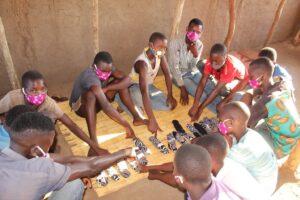Young boys help break the stigma. Period.
When you enter the community of Milange, Mozambique, you might be greeted with an unexpected sight. Boys are gathered underneath a tree with a needle and thread in hand. They’re learning how to make homemade and reusable menstrual pads. “At first, I found it very strange when the mentor said that we would learn how to make menstrual pads,” shared 17-year-old Raul. “With time, I began to realize that we should know about how to help the girls who end up leaving school for fear of getting dirty.”
Millions of women and girls* face stigma and social exclusion simply because their bodies menstruate and they are unable to manage their menstrual cycle in a dignified and healthy way.
Every year on May 28th, Save the Children joins the conversation on Menstrual Hygiene Day to break taboos and stigmas around menstruation. It is also a time to raise awareness around gender equality and girls’ empowerment.
In areas of Mozambique, menstruation causes an increase in school dropout rates and poor hygiene practices, based on misconceptions. Save the Children’s Ungumi project works with youth and community leaders to improve the sexual and reproductive health and rights of adolescents between the ages of 10 and 19, specifically in the communities in the districts of Milange, Morrumbala, and Derre in Zambézia province.
Through the Ungumi project, youth are taught how to sew and work together to create their own reusable menstrual hygiene pads. Traditional pads used by women and girls were quite uncomfortable and restrictive. By making their own, girls and women were able to feel more confident and engage in everyday activities, such as playing soccer and attending school.

Often in rural communities, menstruation is a taboo topic, especially for boys. They don’t speak about it and therefore don’t know anything about it. This leads to the spread of false beliefs, bullying, and teasing, perpetuating girls’ feelings of shame and isolation, sometimes even leading them to drop out of school.
Menstruation was looked at as a form of a curse or a source of illness for men. “Here in the community, we hear that when a girl is menstruating, she cannot talk to boys or put salt in her food, because if she does, the boy will catch a disease in his sex organ, but now we know that this is not true,” shared 17-year-old Edgardo.
The Ungumi project works with communities to challenge and dispel these types of myths around menstruation and ensures that boys learn about the menstrual cycle and how they can support their female classmates, through community mentoring groups and school activists. Adolescent boys were also taught how to make reusable menstrual pads, an innovative initiative that created a safe space for healthy discussions and dialogue around puberty, body changes in girls and boys, and equal opportunities among them.
Gil, who is 15 years old, also learned how to make menstrual pads. He said, “It was good to learn how to make the pads so now I can teach my younger sisters. I heard that the traditional pads leak and fall down easily. If you don’t have the money to buy the pads from the store, then the homemade pads are the best option.”
These homemade pads ensure that girls have access to comfortable, safe, menstrual hygiene products that cost very little money and can be reused. With these products and accurate information about their cycles, young girls feel empowered and confident about their bodies. They attend school, work, and participate in sports while menstruating.
Last year on Menstrual Hygiene Day, 566 million people were reached with positive and impactful images to help break the stigma around periods. This year the goal is to continue the momentum and reach more people. Breaking the stigma around menstruation is one of the first steps necessary to prevent so many of the restrictions placed on girls and women around the world who menstruate.
*We acknowledge the fact that not everyone who menstruates identifies as a girl or woman and also that not all girls and women menstruate
Names have been changed for privacy purposes


